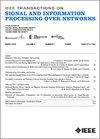Compressed Regression Over Adaptive Networks
IF 3
3区 计算机科学
Q2 ENGINEERING, ELECTRICAL & ELECTRONIC
IEEE Transactions on Signal and Information Processing over Networks
Pub Date : 2024-09-20
DOI:10.1109/TSIPN.2024.3464350
引用次数: 0
Abstract
In this work we derive the performance achievable by a network of distributed agents that solve,自适应网络上的压缩回归
在这项工作中,我们推导出了一个分布式代理网络所能达到的性能,该网络能在存在通信限制的情况下,自适应地解决回归问题。代理采用了最近提出的 ACTC(适应-压缩-然后-组合)扩散策略,其中相邻代理在本地交换的信号由随机差分压缩算子编码。我们对均方估计误差进行了详细的描述,结果表明,该误差由一个与代理在没有通信限制的情况下会达到的误差相关的项和一个由压缩引起的项组成。分析揭示了压缩损失与分布式回归问题基本属性之间的定量关系,特别是梯度噪声和网络拓扑(通过佩伦特征向量)引起的随机近似误差。我们的研究表明,考虑到各代理的个体属性,如数据质量或其在网络拓扑中的中心度,了解这些关系对于优化各代理之间的通信资源分配至关重要。我们设计了一种优化分配策略,其中优化所需的参数可由代理在线学习。示例表明,与盲目(即统一)的资源分配相比,通过所提供的均方误差公式优化分配,可以显著提高性能。
本文章由计算机程序翻译,如有差异,请以英文原文为准。
求助全文
约1分钟内获得全文
求助全文
来源期刊

IEEE Transactions on Signal and Information Processing over Networks
Computer Science-Computer Networks and Communications
CiteScore
5.80
自引率
12.50%
发文量
56
期刊介绍:
The IEEE Transactions on Signal and Information Processing over Networks publishes high-quality papers that extend the classical notions of processing of signals defined over vector spaces (e.g. time and space) to processing of signals and information (data) defined over networks, potentially dynamically varying. In signal processing over networks, the topology of the network may define structural relationships in the data, or may constrain processing of the data. Topics include distributed algorithms for filtering, detection, estimation, adaptation and learning, model selection, data fusion, and diffusion or evolution of information over such networks, and applications of distributed signal processing.
 求助内容:
求助内容: 应助结果提醒方式:
应助结果提醒方式:


